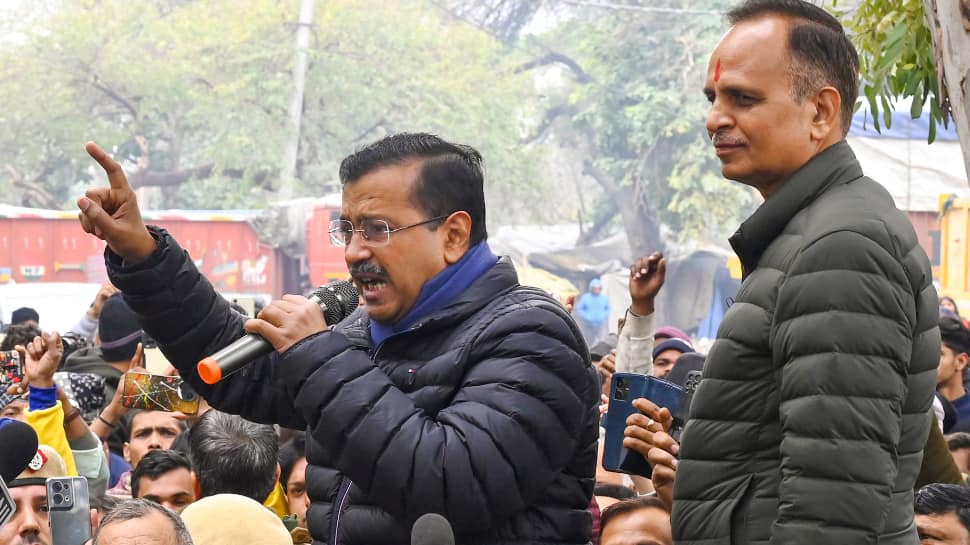 |
|
The upcoming Delhi Assembly elections, scheduled for February 5th, 2025, have intensified the political rhetoric, with accusations and counter-accusations flying between the major contenders. A significant flashpoint in this escalating campaign is the issue of slum demolitions and land acquisition, a matter that directly affects a substantial portion of Delhi's population. Arvind Kejriwal, the national convenor of the Aam Aadmi Party (AAP), has launched a scathing attack against the Bharatiya Janata Party (BJP), alleging a premeditated plan to demolish slums in the national capital after securing votes in the upcoming elections. This accusation, delivered during a press conference in Shakur Basti, has significantly escalated tensions in the already charged political environment.
Kejriwal's core allegation centers on the BJP's purported intention to prioritize land acquisition over the welfare of slum dwellers. He contends that the BJP's promises are merely a cynical ploy to garner votes, with the actual demolition of slums and seizure of land to follow after the election results are declared. His statement, ‘They want your votes first and your land after the elections,’ encapsulates this accusation, highlighting the alleged duplicity at the heart of the BJP's strategy. The AAP leader specifically targeted the BJP's 'Jahan Jhuggi Wahan Makaan' (Where there's a slum, there's a house) scheme, dismissing it as a deceptive façade, citing the relatively small number of flats built for slum dwellers (4,700) in the past five years as evidence of its failure to address the scale of the problem. He further amplified his accusations by presenting evidence of railway land tendering, indicating that the BJP is allegedly aware of future land acquisitions affecting slum communities, yet failing to inform or protect those residents.
The timing of Kejriwal's accusations is strategically significant, coming just weeks before the crucial elections. The AAP, having secured a resounding victory in the 2020 elections, is seeking a third consecutive term. This challenge from the AAP places significant pressure on the BJP, forcing them to defend their record on slum rehabilitation and address the concerns raised by Kejriwal's accusations. The AAP's campaign appears to be strategically targeting the concerns of the slum-dwelling population, a significant voting bloc, by presenting the BJP as a party that prioritizes land acquisition over the well-being of its residents. This populist approach attempts to garner support by portraying the BJP as exploitative and insensitive to the needs of marginalized communities. The AAP's framing of the issue seeks to resonate with voters who are directly affected by such policies, and it will be crucial to see how this impacts voter decisions in the upcoming elections.
The BJP, in response, is likely to vigorously contest Kejriwal's allegations, possibly by highlighting its own development initiatives and arguing that the AAP's accusations are politically motivated. The ensuing debate will likely dominate the final weeks of the campaign, shaping the narratives surrounding this critical election. The controversy also highlights a broader issue concerning the rights and welfare of slum dwellers in urban India, a complex social and political problem that extends far beyond the immediate context of the Delhi elections. The outcome of the elections will not only determine the future government of Delhi but also reflect the broader public opinion on these critical issues of urban development and social justice.
The presence of senior AAP leader Satyendar Jain at the press conference underscores the party's commitment to making this a central issue in the campaign. Jain, contesting his fourth consecutive election from Shakur Basti, adds a personal dimension to the issue, emphasizing the party's deep roots within the community and its ongoing engagement with their concerns. The upcoming election results will reveal the extent to which the AAP’s strategy of framing the land acquisition and slum demolition issues as a central campaign point, resonates with voters. The scale of voter response will provide a compelling indication of the political weight this particular narrative carries in the minds of Delhi's electorate and the extent to which it influences the eventual outcome of the elections.
Source: ‘Votes First, Land After...’: Kejriwal's New Allegation Against BJP Ahead Of Delhi Polls
